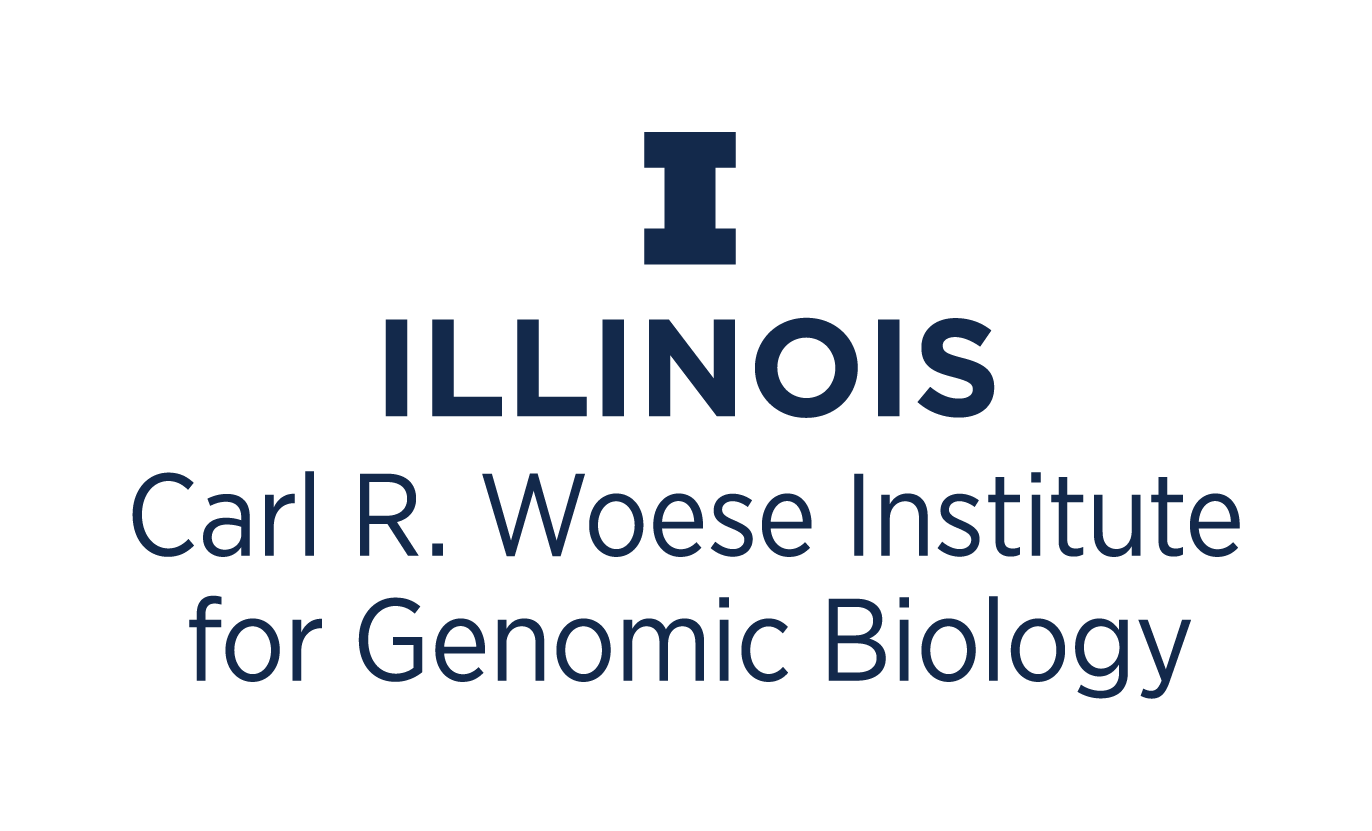Shape of tumor may affect whether cells can metastasize
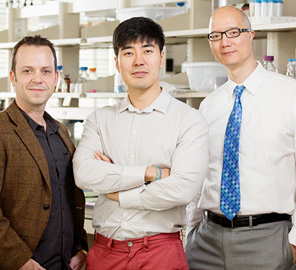 Illinois researchers found the shape of a tumor may play a role in how cancer cells become primed to spread. led by materials science and engineering professor Kristopher Kilian (left).
Illinois researchers found the shape of a tumor may play a role in how cancer cells become primed to spread. led by materials science and engineering professor Kristopher Kilian (left).
Light illuminates the way for bio-bots
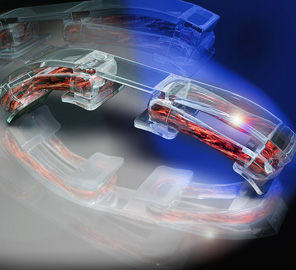 A new class of muscle-powered walking bio-bots responds to light and has a modular design, in recent research led by Rashid Bashir, Abel Bliss Professor of Engineering and Head of Bioengineering.
A new class of muscle-powered walking bio-bots responds to light and has a modular design, in recent research led by Rashid Bashir, Abel Bliss Professor of Engineering and Head of Bioengineering.
Creating bio-machines to improve health
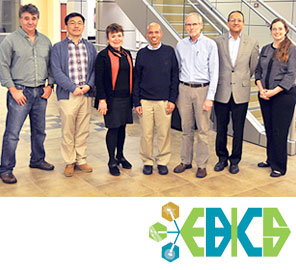 By studying the behavior of living cells and combining them with synthetic tissue, researchers are creating “biological machines” to deliver drugs, function as diagnostic tools, and serve as contaminant sensors.
By studying the behavior of living cells and combining them with synthetic tissue, researchers are creating “biological machines” to deliver drugs, function as diagnostic tools, and serve as contaminant sensors.
Bacterial hole puncher could be new broad-spectrum antibiotic
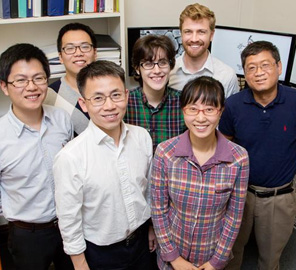 A team of researchers developed a new broad-spectrum antibiotic that kills bacteria by punching holes in their membranes.
A team of researchers developed a new broad-spectrum antibiotic that kills bacteria by punching holes in their membranes.
Before nature selects, gene networks steer a course for evolution
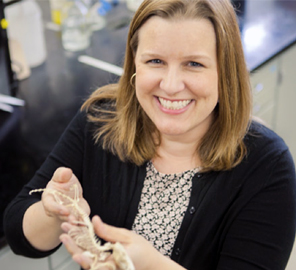 Biologists and mathematicians at the University of Illinois work together to examine the developmental sources of variation within and between species.
Biologists and mathematicians at the University of Illinois work together to examine the developmental sources of variation within and between species.
Genomes Tell Story of Native American Biological Origins
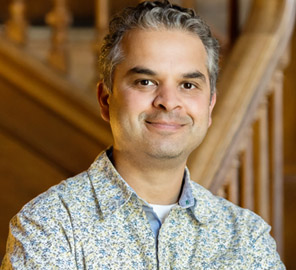 An international team of researchers, including Associate Professor of Anthropology Ripan Malhi, help clarify history of migration to the Americas with an extensive sequencing study.
An international team of researchers, including Associate Professor of Anthropology Ripan Malhi, help clarify history of migration to the Americas with an extensive sequencing study.
Monkey Droppings Complement Field Observations, Researchers Report
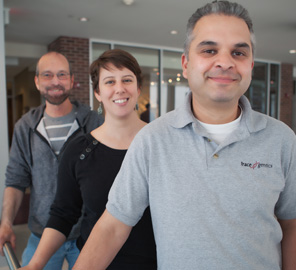 Behavioral observation, ecological sampling, and high-throughput sequencing give researchers insight into tamarin foraging strategies and prey preferences in study involving Associate Professor of Anthropology Ripan Malhi.
Behavioral observation, ecological sampling, and high-throughput sequencing give researchers insight into tamarin foraging strategies and prey preferences in study involving Associate Professor of Anthropology Ripan Malhi.
Glacial Moraines Influence New Techniques in Biomedicine
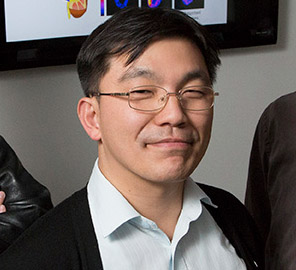 Associate Professor of Chemical and Biomolecular Engineering Hyunjoon Kong and his team look to glacial moraines as inspiration for more precise delivery of micro-therapies.
Associate Professor of Chemical and Biomolecular Engineering Hyunjoon Kong and his team look to glacial moraines as inspiration for more precise delivery of micro-therapies.
Illinois and AAAS Co-sponsor Bioengineering Panel
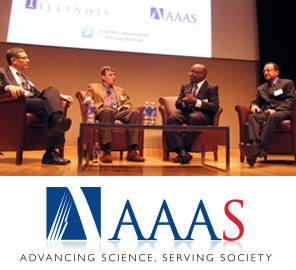 A panel consisting of Gene Robinson, John Rogers, Todd Coleman, and Rashid Bashir discuss the future of bioengineering at "Visionary Frontiers at the Convergence of Biology, Medicine and Engineering" in Washington, D.C.
A panel consisting of Gene Robinson, John Rogers, Todd Coleman, and Rashid Bashir discuss the future of bioengineering at "Visionary Frontiers at the Convergence of Biology, Medicine and Engineering" in Washington, D.C.
Study Yields Insights into Human, Dog Migration in the Americas
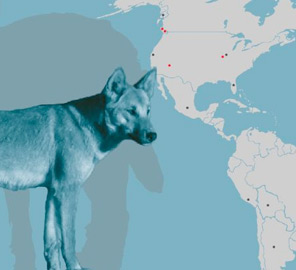 Professor of Anthropology Ripan Malhi led a study with grad student Kelsey Witt which suggests dogs may have first migrated to the Americas 10,000 years ago.
Professor of Anthropology Ripan Malhi led a study with grad student Kelsey Witt which suggests dogs may have first migrated to the Americas 10,000 years ago.
New research may help doctors personalize cancer treatments
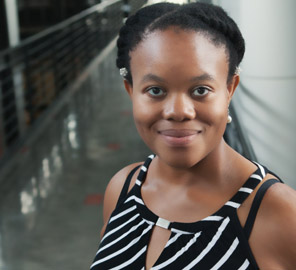 In recent papers, Assistant Professor of Bioengineering Princess Imoukhuede and co-authors have made significant progress in personalizing angiogenesis inhibition cancer treatments.
In recent papers, Assistant Professor of Bioengineering Princess Imoukhuede and co-authors have made significant progress in personalizing angiogenesis inhibition cancer treatments.
Cell mechanics may hold key to how cancer spreads and recurs
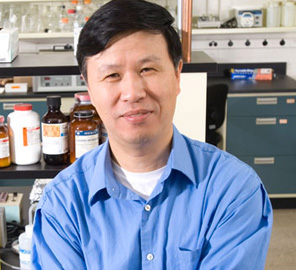 Professor Ning Wang led a team that found that tumor-repopulating cancer cells can go dormant in stiffer tissues but wake up and multiply when placed in a softer environment.
Professor Ning Wang led a team that found that tumor-repopulating cancer cells can go dormant in stiffer tissues but wake up and multiply when placed in a softer environment.
Ripan Malhi featured on Day of Archaeology website
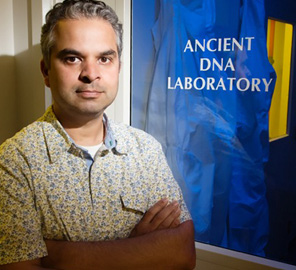 Associate professor of anthropology and IGB member Ripan Malhi was featured on the Day of Archaeology website with the article "Molecular Archeology Puts Artifacts in Perspective."
Associate professor of anthropology and IGB member Ripan Malhi was featured on the Day of Archaeology website with the article "Molecular Archeology Puts Artifacts in Perspective."
New technique first step to stem cell specialization
 Professor Ning Wang led a team that found the precise combination of mechanical forces, chemistry and timing to help stem cells differentiate into three germ layers, the first step toward developing specialized tissues and organs.
Professor Ning Wang led a team that found the precise combination of mechanical forces, chemistry and timing to help stem cells differentiate into three germ layers, the first step toward developing specialized tissues and organs.
Researchers combine weak chemical forces to strengthen a novel imaging technology
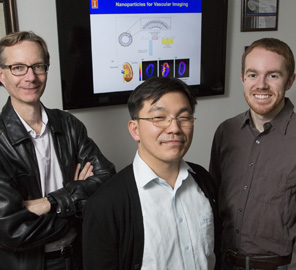 Hyunjoon Kong, Steven Zimmerman, Cartney Smith, and collegues have developed a new nanoparticle design, inspired by cell membranes, which has led to clearer MRI images and paved the way for better diagnostic tools.
Hyunjoon Kong, Steven Zimmerman, Cartney Smith, and collegues have developed a new nanoparticle design, inspired by cell membranes, which has led to clearer MRI images and paved the way for better diagnostic tools.
IGB researcher stars in national TV series
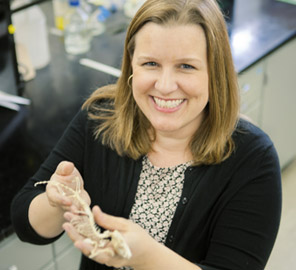 Karen Sears, Assistant Professor at the School of Integrative Biology, appeared on the PBS series Your Inner Fish, which traces 350 million years of human evolution
Karen Sears, Assistant Professor at the School of Integrative Biology, appeared on the PBS series Your Inner Fish, which traces 350 million years of human evolution
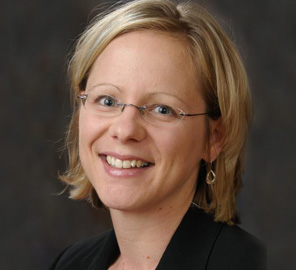 Interdisciplinary collaboration is a fundamental tenet of the IGB, and also central to the work of Mechanical Science and Engineering Professor Amy Wagoner Johnson, a faculty member of IGB’s Regenerative Biology & Tissue Engineering (ReBTE) theme.
Interdisciplinary collaboration is a fundamental tenet of the IGB, and also central to the work of Mechanical Science and Engineering Professor Amy Wagoner Johnson, a faculty member of IGB’s Regenerative Biology & Tissue Engineering (ReBTE) theme.
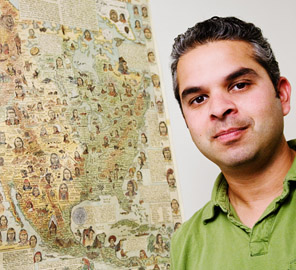 Anthropology professor and IGB member Ripan Malhi works with Native Americans to collect and analyze their DNA and that of their ancestors.
Anthropology professor and IGB member Ripan Malhi works with Native Americans to collect and analyze their DNA and that of their ancestors.
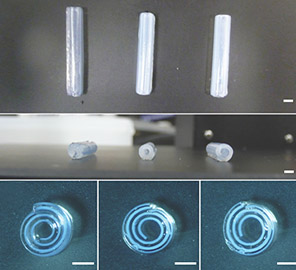 Hyunjoon Kong and collaborators have developed a synthesized substance that folds itself into a shape which can control the flow of an embedded drug.
Hyunjoon Kong and collaborators have developed a synthesized substance that folds itself into a shape which can control the flow of an embedded drug.
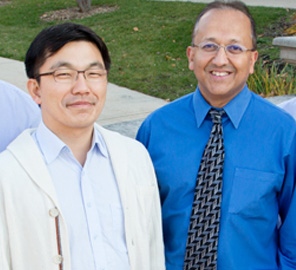 With the aid of a 3-D printer, Illinois researchers including IGB affiliate Rashid Bashir (above, right) and IGB faculty Hyunjoon Kong (left) have fashioned soft, 7mm biological robots out of gel-like material and rat heart cells.
With the aid of a 3-D printer, Illinois researchers including IGB affiliate Rashid Bashir (above, right) and IGB faculty Hyunjoon Kong (left) have fashioned soft, 7mm biological robots out of gel-like material and rat heart cells.
 U. of I. researchers have developed a bandage that stimulates and directs blood vessel growth on the surface of a wound. “Any kind of tissue you want to rebuild, including bone, muscle or skin, is highly vascularized,” says chemical and biomolecular engineering professor Hyunjoon Kong, a co-principal investigator on the study with electrical and computer engineering professor Rashid Bashir.
U. of I. researchers have developed a bandage that stimulates and directs blood vessel growth on the surface of a wound. “Any kind of tissue you want to rebuild, including bone, muscle or skin, is highly vascularized,” says chemical and biomolecular engineering professor Hyunjoon Kong, a co-principal investigator on the study with electrical and computer engineering professor Rashid Bashir.
Awards
Hyunjoon Kong, Associate Professor and Centennial Scholar in Chemical and Biomolecular Engineering has received the 2016 Campus Distinguished Promotion Award, given by the Campus Committee on Promotion and Tenure for excellence within the recipient's field.
Matthew Wheeler, Professor of Animal Sciences received a Campus Award for Excellence in Faculty Leadership from the University of Illinois for his service and loyalty to the university.
Marni Boppart, Associate Professor of Kinesiology and Community Health received a Campus Excellence in Undergraduate Teaching Award from the University of Illinois for her positive impact on student learning.
Karen Sears, Associate Professor of Animal Biology received a Campus Excellence in Undergraduate Teaching Award from the University of Illinois for her positive impact on student learning.
Rex Gaskins, Professor of Immunobiology, Departments of Animal Sciences and Pathobiology has received a Distinguished Scientist Award from the Society for Experimental Biology and Medicine (SEBM).
Hyunjoon Kong, Associate Professor and Centennial Scholar in Chemical and Biomolecular Engineering has received the College of Engineering Dean's Award for Excellence in Research, given annually to faculty in recognition of their outstanding research.
Karen Sears, Associate Professor of Animal Biology has won the Lynn Martin Award for Distinguished Women Teachers from the College of Liberal Arts and Sciences.
Brendan Harley, Assistant Professor of Chemical & Biomolecular Engineering, received the Everitt Award for Teaching Excellence.
Jianjun Cheng, Associate Professor of Materials Science and Engineering has been chosen as an American Institute for Medical and Biological Engineering (AIMBE) Fellow.
Kristopher Kilian, Assistant Professor of Materials Science and Engineering, received a National Science Foundation CAREER Award.
Brendan Harley, Professor of Chemical and Biomolecular Engineering was named a 2015-16 Center for Advanced Study Fellow.
Karen Sears, Assistant Professor of the School of Integrative Biology has been named a 2015-2016 Helen Corley Petit Scholar.
Rashid Bashir, Bioengineering Professor and Department Head has been elected a Fellow of the International Academy of Medical and Biological Engineering (IAMBE).
Brendan Harley, Professor of Chemical and Biomolecular Engineering and Phillip Newmark, Professor of Cell and Developmental Biology have been elected 2014 fellows of the American Association for the Advancement of Science.
Marni Boppart, Associate Professor in Kinesiology and Community Health has been elected a Fellow in the American College of Sports Medicine.
Stephen A. Boppart, Abel Bliss Professor of Engineering was among the researchers to receive the 36 Early Concept Grants for Exploratory Research (EAGER) announced by the National Science Foundation. The grants were awarded to enable new technologies to better understand how complex behaviors emerge from the activity of brain circuits.
Deborah Leckband, Reid T. Milner Professor of chemical and biomolecular engineering has been elected a 2014 fellow of the Biomedical Engineering Society.
Rashid Bashir was selected as Chair of the Nanotechnology Study Section (NANO) in the Center for Scientific Review of the National Institutes for Health. NANO reviews applications focused on research in bioengineering and technology development relating to the unique properties of nanomaterials.
Sharon Donovan received the Spitze Land-Grant Professorial Career Excellence Award from the College of ACES, to recognize the performance and commitment of tenured faculty in their professorial career. View the video here.
Stephen Boppart has been named a Fellow of the American Association for the Advancement of Science.
Brendan Harley received the Everitt Award for Teaching Excellence from the College of Engineering for development of an innovative elective course on tissue engineering. The winner of this award is selected by students from the Engineering Council. Brendan also was selected to receive the 2014 Young Investigator Award of the Society for Biomaterials. This award is given to recognize an individual within ten years of their terminal degree who has demonstrated outstanding achievements in the field of biomaterials research. In 2013, Brendan was awarded a NSF Faculty Early Career Development (CAREER) Award. These grants are among the most prestigious given to the best young university faculty, in a highly competitive annual program. They recognize the outstanding efforts of these individuals and their leadership in the integration of education and research.
Paul Kenis was selected by the University of Illinois as the William H. and Janet G. Lycan Professor of Chemistry.
Hyunjoon Kong has been named a Centennial Scholar by the College of Liberal Arts and Sciences.
Amy Wagoner Johnson was awarded a Chair of Excellence by the NanoSciences Foundation, an award program that attracts talented researchers to collaborate with laboratories on progressive research projects in Grenoble, France.
Bo Wang received a Career Award at the Scientific Interface by the Burroughs Wellcome Fund, designed to support those seeking to merge their education in engineering, computation or mathematics with an academic career in the biological sciences.

